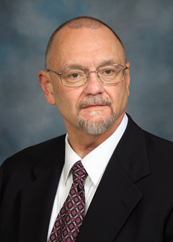 |
Tom Rosenquist, Ph.D. |
“Our goal is to be the best place in the country to do biomedical research,” said Tom Rosenquist, Ph.D., vice chancellor for research. “With NIH funding basically stagnant since 2003, and losing about 5 percent by 2007 with inflation, we are thrilled to see our research enterprise moving forward in what has been a difficult time for many research institutions. It speaks volumes for the quality of our scientists and the momentum we have in place. Just think how well we would be doing if the NIH was in a growth mode.”
Dr. Rosenquist credited several factors for UNMC’s research success:
- Selective growth in UNMC’s strongest and most strategic areas of research excellence;
- Use of the Nebraska Tobacco Settlement Biomedical Research Development Fund to provide the principal funding to allow UNMC to recruit and retain NIH-funded investigators;
- UNMC’s outstanding research facilities – the Durham Research Center and The Lied Transplant Center;
- UNMC’s culture of respect for research and its nurturing of researchers.
The U.S. Department of Commerce Bureau of Economic Analysis estimates that for every $1 million of research funding, 33 new jobs are created. Using this formula, Dr. Rosenquist said UNMC’s research enterprise is responsible for more than 2,600 jobs.
“UNMC is without a doubt one of the key economic drivers in the state,” Dr. Rosenquist said. “These jobs created by our research are high paying positions, and they have a significant impact on our state’s economy.
“All of these grant and contract dollars are here because UNMC scientists can compete globally. It’s money that would never find its way to Nebraska if not for our research enterprise.”
UNMC Chancellor Harold M. Maurer, M.D., lauded the UNMC researchers for increasing research funding in spite of NIH cutbacks. “The competition has never been more fierce for research dollars,” he said. “We are more than holding our own. It’s truly exciting – for our institution and the entire state – to see us put together another record-breaking year. It really bodes well for the future. We are on a very positive trajectory.”
In the past three years, UNMC’s research funding has increased 37 percent, going from nearly $58 million to nearly $80 million. During this same period, NIH funding at UNMC has increased by 48.2 percent, rising from $32.8 million to $48.7 million.
Likewise, UNMC’s total number of grants has increased by 11 percent in the past three years, going from 364 to 403. UNMC’s NIH grants – considered to be the “gold standard” for researchers – are up 18.4 percent in the last three years, rising from 98 to 116, Dr. Rosenquist said.
“With nearly $80 million in research funding, we are rapidly closing in on the $100 million mark,” Dr. Rosenquist said. “Once an institution reaches the $100 million plateau, it provides a level of momentum that leads to sustainability and further growth. We think it’s quite conceivable that we could reach $200 million by the end of this decade.”
One of the reasons for Dr. Rosenquist’s optimism is the proposed addition of a second research tower adjacent to the Durham Research Center.
The 252,179 gross square feet building will be nearly identical to the Durham Research Center, which opened in 2003. As with the Durham Research Center, funding for the $74 million second research tower will come primarily from private fundraising efforts. Completion of the second tower is expected by winter of 2008.
Featuring 98 state-of-the-art laboratories, research activities within the second research tower will be multidisciplinary, grouped around UNMC priority areas, including cancer, biosecurity, cardiovascular diseases, gastrointestinal and liver diseases, developmental biology, genetics and molecular genetics, neurobiology, and organ transplantation biology.
“The importance of this second research tower cannot be overstated,” Dr. Rosenquist said. “Facilities are a critical feature for successful recruitment and retention of excellent researchers. It will have an immediate impact on our ability to bring in more outstanding investigators.”
A groundbreaking ceremony will be held Aug. 8 for the second research tower. Watch UNMC Today for more details on the groundbreaking.